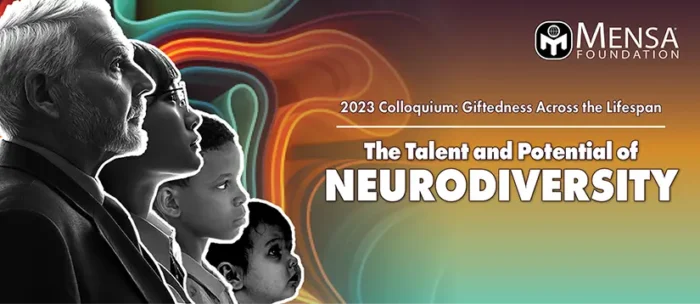
Joining the Conversation
How are you smart? Have you ever been asked this question? Unfortunately, for the majority of the population, the answer is probably no. Not because intelligence is such a limited commodity but because we, as a society, have placed it in a box labeled IQ and thus convinced ourselves of its scarcity. We only allow those who possess an IQ score above a certain threshold to carry the title of intelligent. By building a society where IQ scores are the sole determining factor for measuring intelligence we have in essence done to intelligence what a brilliant marketing campaign did for the diamond industry.
This piece began as a personal response to the Mensa Foundation’s invitation to #JoinTheConversation, a call for all of us to explore what intelligence really means and how it shows up in the world. That prompt sparked reflection on my own journey through giftedness, neurodivergence, and the many ways we define and often limit intelligence. If we truly want to unleash intelligence for the benefit of humanity, we must begin by rethinking how we understand it and where we’re willing to look for it.
Neurodivergent
Being neurodivergent means having a brain that works differently from the average or “neurotypical” person. (Cleveland Clinic)
Neurodivergent is not a medical term. Popularized by a social movement, it is now widely used by the public to represent a wide umbrella of atypical neurodevelopment. Some models include various mental health diagnosis, ADHD, Autism Spectrum Disorder, OCD and even Giftedness. According to the Cleveland Clinic, people with neurodivergent brains have different strengths and challenges from those who are not neurodivergent. “Possible strengths include better memory, being able to mentally picture three dimensional objects easily, and the ability to solve complex mathematical calculations in their heads.”(ClevelandClinic)
I am probably dating myself here but, I grew up competing in a UIL category called Number Sense. The basic premise was to work through as many progressively rigorous mathematic equations as you could complete in a predetermined time frame. The catch was that you were only given your answer sheet and a pencil that had no eraser. No scratch paper, no calculator, and your desk and answer sheet were inspected for tally marks or any indications that you had not done the calculations completely in your head. As a child this talent served only to separate me from my peers. As an adult, I have found it to be an incredibly useful skill to have especially when I was adding up floorplan dimensions in my first career or calculating IV dosages in my second one.
The World Economic Forum (WEF) estimates that between 10%-20% of the population are considered neurodivergent. A study featured by WEF concluded that teams with neurodivergent professionals can be 30% more productive than those without them.(World Economic Forum)
People believed to have been neurodivergent by experts: (ClevelandClinic)
- Nobel Prize-winning Physicist and Chemist: Marie Curie
- Nobel Prize-winning Theoretical Physicist: Albert Einstein
- Artist: Vincent Van Gogh
- Inventor and Engineer: Nikola Tesla
- Author: F. Scott Fitzgerald
Gifted
“Giftedness is asynchronous development in which advanced cognitive abilities and heightened intensity combine to create inner experiences and awareness that are qualitatively different from the norm. This asynchrony increases with higher intellectual capacity. The uniqueness of the gifted renders them particularly vulnerable and requires modifications in parenting, teaching and counseling in order for them to develop optimally.”(Columbus Group)
Not only did I grow up under this label, but I have raised and homeschooled my children who also qualify under this category. I whole heartedly agree with the Columbus Group assessment that these children require modified parenting and teaching to thrive. My youngest son attended a new school in the fourth grade when we had to move across state. The teachers told me that they had resorted to giving him the entire day’s work at the beginning of class and when he finished it, approximately 45 minutes later, they would tell him to spend the rest of the day in the school library where he read books. This is when we went back to homeschooling.
Gifted is a term frequently used to describe a person of high intelligence, often interchangeably with words like prodigy. Unfortunately, even in the world of education there is no definition that is universally agreed upon. If you defer to the dictionary definition of the word, it would be a disservice to not categorize anyone “having a great natural ability,” as gifted. (Merriam Webster)
Can you reasonably argue that Mozart or Michelangelo were not gifted? Is Michael Phelps gifted? What about Simone Biles? I know, those last two create a whole new argument based on natural abilities verses what can be learned or achieved through dedication and hard work. However, if giftedness was not part of the equation, would we not have more athletes with 23 or even 7 gold medals hanging on their walls?
Intelligence
“Intelligence is a mental characteristic that consists of the ability to learn from experience, adapt to new situations, understand and apply abstract concepts, and use knowledge to comprehend the environment.” (Mensa)
My oldest son is on the autistic spectrum. When he was approximately 10 years old our Neurologist told me that he would never be capable of turning short-term memory into long-term memory. As both a mother and a woman of some scientific understanding I found this statement to be profoundly absurd, especially coming from someone as highly educated as a Pediatric Neurologist. I absolutely refused to accept that version of reality for my son. I understood enough about neuroplasticity to know that the brain of a healthy 10-year-old boy was reasonably capable of forming the necessary neuropathways to bridge the gap to connect his memory centers even if no connection originally existed.
According to John Hopkins “in some cases, the brain learns to reroute information and function around the damaged areas.”(JohnHopkins) I will not attempt to tell you that the process was an easy one, but the end result: today my 26-year-old son can sort through the Rolodex of his mind and pinpoint essentially any movie quote or family memory since his 5th birthday. I would definitely classify that under the “ability to learn from experience and adapt to new situations,” category.(Mensa)
Our oldest son is also the “Family Inventory Guy.” He can tell you everything in our house, how much we have left, and where it is located. This may not sound like the world’s measure of traditional intelligence but, virtually every business has a computer program that keeps this kind of real time inventory tracking that my son maintains inside his brain. This is “the ability to apply knowledge to manipulate one’s environment.” (Merriam Webster) Or you could also say “the ability to use knowledge to comprehend the environment.”(Mensa)
For so long we have only been focused on one type of intelligence: “thinking abstractly as measured by objective criteria”-IQ tests. (Merriam Webster) The IQ testing threshold for Mensa membership disqualifies 98% of the population. I want to refer for a moment to my diamond analogy. Diamonds are not rare. They are incredibly plentiful, but a single organization determines each year how many of them are released to the public so that the diamonds hold their value.
I do not believe that intelligence is so rare that only 2% of the population possess it. What I do believe is that those of us that meet the requisite criteria have positioned ourselves as the authorities on intelligence. We have created this 2% reality for ourselves because of our own unwillingness to look for intelligence that exists in any form that we cannot measured by an IQ test; quite possibly because IQ tests are the apparatus by which we have defined our own intelligence.
There was a time not too long ago that I found myself repeatedly correcting my youngest daughter’s mistaken impression that she was not even of average intelligence. One tear-filled afternoon I asked her where was this incredible insecurity coming from. I was questioning everything about my parenting of her at this moment that she would be questioning her intelligence in this way so frequently over the past year or so. Then we had a breakthrough. She told me: “Mom you don’t have to lie to me; I saw my IQ score!” I asked her what she was talking about. We had taken her and my youngest son for some neuropsychological testing almost a year prior and I sent both their reports to them because I believe they should be informed about their own mental and physical health.
She told me her IQ score on the testing, which was an obscenely low number. I instantly knew what had happened and told her to pull up the report. Through blurry, tear-stained eyes I explained that the test results they gave her were broken into categories. The actual comprehensive IQ score was this one located farther down the page. This is when I personally realized the importance that society has placed on this single measure of intelligence. While my daughter felt better after realizing her mistake, she spent a year believing she was not intelligent because she thought her IQ was not to the societal standard of “intelligent.”
I am convinced that the time has come to expand our minds to the reality that intelligence is much bigger than IQ scores. No two neurodivergent brains are the same; leading to infinite combinations of gifts, talents, capabilities, and yes, intelligence. I want to open our world up to look for the intelligence and brilliance in the untapped resource of the neurodivergent brains that comprise 10%-20% of the world’s population.
I was inspired to share my story because I believe that each of our experiences have value and we all have an important perspective to bring to this conversation. It is my hope that if you have questions or experiences that you would like to share, you will #JointheConversation. Together, we can advance this dialog.










Comments (0)